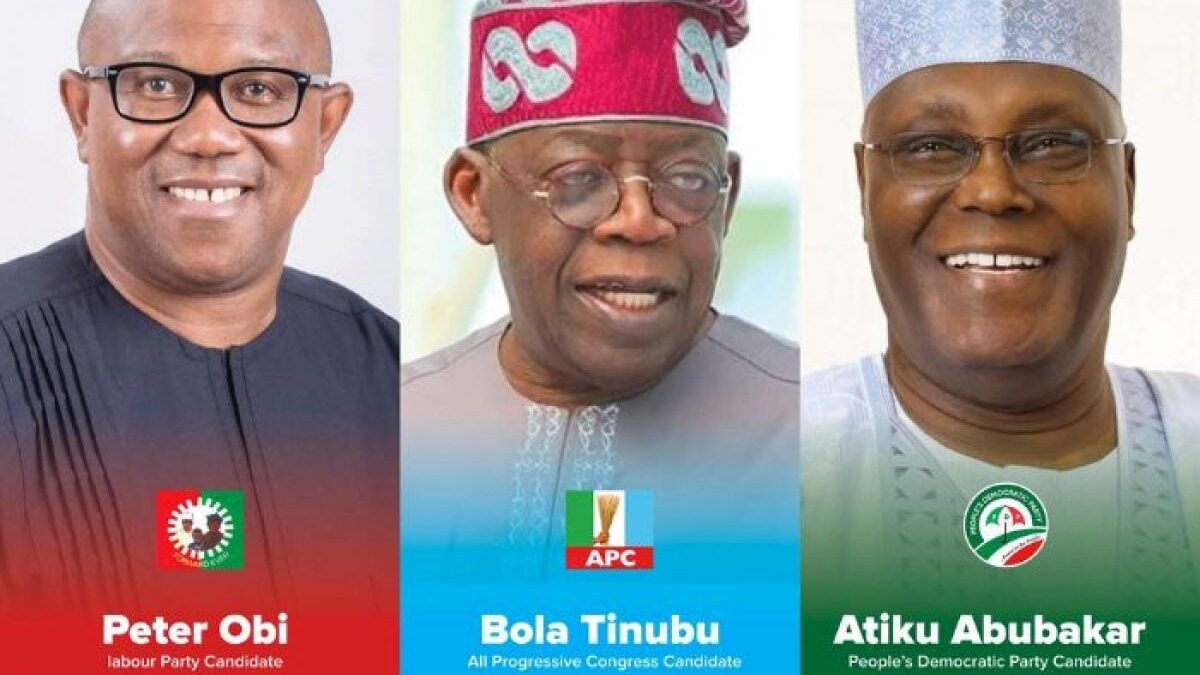BY EMMANUEL AMOKE CHIDERA

In a retrospective look at Nigeria’s Fourth Republic since its inception in 1999, there has been a recurring theme of contested elections. Remarkably, only the 2015 general elections stand as an exception to this pattern. Equally noteworthy is the fact that none of these electoral disputes, including those that ascended to the apex court, the Supreme Court, achieved success.
The inception of the 1999 Republic, which ushered in former military head of state President Olusegun Obasanjo, was met with opposition from Olu Falae of the Alliance of Democracy (AD). Subsequently, in 2004, Muhammadu Buhari of the All Nigeria People’s Party (ANPP) contested the election outcome that returned Obasanjo but faced defeat at the Supreme Court. In 2007, both Muhammadu Buhari of the ANPP and Atiku Abubakar of the Action Congress of Nigeria (ACN) similarly contested the controversial elections that brought in Umaru Musa Yar’adua, meeting the same fate at the apex court. Buhari re-entered the electoral arena in 2011 under the Congress for Progressive Change (CPC), only to contest the result alongside Nuhu Ribadu of the ACN after losing to President Goodluck Jonathan of the Peoples Democratic Party (PDP). In 2019, Atiku’s unsuccessful challenge contested the presidential election result, which upheld the incumbent President Buhari’s victory, once again at the Supreme Court.
Fast forward to the 2023 general elections that brought President Bola Ahmed Tinubu to power, the electoral landscape was alleged to be marred by a multitude of irregularities. This raised significant concerns among citizens, leading to appeals and legal contests by three contending parties. This year’s election landscape was further characterized by heightened political awareness, fueled by the growing economic challenges facing the nation. Amidst the buzz surrounding the appeals for a review of the election results, one might easily overlook the recurring nature of such contests, almost becoming a tradition.
Anticipation mounted as a substantial portion of the population awaited the judgment of the Presidential Election Petitions Tribunal (PEPT), which was delivered on September 6th. Despite the prevailing perception of deep-seated corruption within the system, many Nigerians still hoped, expecting a favorable outcome from the judiciary.

The judgment, presided over by a five-member panel led by Justice Haruna Tsammani, commenced with the review of the APM petition. It was promptly dismissed due to technical irregularities, particularly the double nomination claim against Tinubu’s running mate. Justice Haruna Tsammani emphasized that this claim lacked substance, as it had already been resolved by the Supreme Court. He emphasized, “Nothing in the constitution bars a candidate from nominating a running mate if the original running mate withdraws. You don’t need primaries to pick a running mate.”
Turning to the petitions of Peter Obi and Labour Party, the second petitioner, they faced setbacks as ten of their thirteen witnesses had their statements dismissed as inadmissible. Following a six-hour verdict, all petitions against President Bola Ahmed Tinubu and the APC by Peter Obi and the Labour Party were dismissed. The tribunal concluded that the petitioners had made “generic accusations of irregularities” without specifying the anomalies, locations, or those affected. Justice Abba Mohammed further pointed out that they had failed to provide the number of votes affected or the number of disenfranchised individuals. Although Peter Obi and the Labour Party claimed to have garnered the majority of lawful votes, they failed to specify the number of lawful votes they had secured.
The tribunal also ruled against the Labour Party’s petition regarding election malpractices in most polling units, citing a lack of evidence to substantiate these claims. Furthermore, the reports of forensic analyses submitted by three Labour Party witnesses were rejected on the grounds that they were either conducted during the ongoing case or conducted by parties with vested interests.
The European Union report on the presidential election was also rejected, with the tribunal noting that it lacked authentication by an official from the body that authored it and did not possess the original true copy.
In addition, the tribunal refused to admit the evidence tendered by LP’s web engineer, Mpeh Ogar, concerning a technical glitch observed on the INEC result viewing portal. The tribunal justified this decision by stating that Ogar was an interested party in the petition, having vied for elective office on LP’s platform.
Further disallowances ensued as the court rejected the submission of 18,088 blurred polling unit results by Mr. Peter Obi. The court argued that these results were presented by an individual without the requisite competence to testify about them, and their blurred and illegible nature rendered their accuracy undeterminable.

Regarding the petition regarding the 25% of FCT required to win the Presidential election submitted by Peter Obi and the Labour Party, the tribunal dismissed it, asserting that FCT citizens did not enjoy special privileges over other Nigerians residing in different states.
Similarly, the court ruled on the $460,000 forfeiture petition presented by the Labour Party, categorizing it as a civil forfeiture rather than a criminal one according to Section 137 of the Nigerian Constitution. The petition failed to prove that Bola Tinubu had been charged, tried, or convicted in the United States, consequently failing to meet the requirements for disqualification.
Finally, the petition against INEC concerning the mode of transmission of election results was addressed. The tribunal declared that INEC had the liberty to define the mode of transmission as outlined in Section 52 and Section 65 of the Electoral Act. It emphasized that INEC could not be compelled to electronically transmit results.
Additionally, the tribunal asserted that Peter Obi and the Labour Party had not succeeded in establishing that INEC had deliberately refused to upload results to the IReV platform in order to manipulate the election results in favor of President Bola Tinubu.
Peter Obi’s and the Labour Party’s petition verdict was followed by Atiku Abubakar’s petition. The court initiated proceedings by ruling that Atiku’s claim of widespread overvoting across Nigeria lacked substantiating proof. Conclusively, the Tribunal held that such a claim remained vague and unsupported by evidence.
As a final judgment, the tribunal upheld and affirmed the election that ushered in Bola Ahmed Tinubu as president, invalidating all claims by the contending parties. Furthermore, the PEP Tribunal fines the parties involved for “frivolous petitions”. APM was fined to the tune of 13,675,890.00 naira, Peter Obi and Labour Party to the tune of 47,910,431.87, and finally Atiku and PDP to the tune of 23,391,001.45, with automaton to pay within 48 hours.
Related posts
‘Riverdale’ Renewed For Season 7
‘We’ve Met Yearnings Of Nigerians’- Buhari
Reviews
Follow Our Activities On Facebook
4 hours ago
4 hours ago
6 hours ago
7 hours ago
11 hours ago
SUBSCRIBE
[mc4wp_form id=”2012″]
Top Reads!
#BigBrotherNaija “Level Up” Week 6
Though last Sunday Sunday was meant to be a “no-eviction” day, it came as a shocker when fake housemate, Modella…
Dating in 2022; Situationships Are Not For The Fainthearted
Situationships are defined as that space between a defined relationship and something other than a friendship. It is a romantic…
20 Questions With Dinta Media’s Visual Storyteller, Chimeremogo Nwoke
Dinta Media is not really just a media production brand but we like to see ourselves as a hub for…
How Are Nigeria’s Small Businesses Coping?
The current rising rate of inflation and other burdens against the Nigerian economy speaks to the realities of the times.
Thrifting Is All The Rave Now, Here’s Why
By Amy Adindu The affordable clothing movement has gained global attention and acceptance as we’re all trying to look like…
#BigBrotherNaija “Level Up” Week 2
Week 2 of the highly watched Nigerian TV show kicked off with an early plot twist. On Sunday, Big Brother…
#BlueTunes: Burna Boy, Omah Lay Top Album Picks For July
July was a promising month for music lovers; from Lizzo’s album titled Special and Imagine Dragons’ Mercury, (Acts 1 &…
#BlueTunes Album Picks For June
Gbagada Express – Boj Bolaji Odojukan, popularly known as BOJ, was raised both in England and Nigeria. He shot to…
“A Creative’s Dream” with Jeff Chinonso
On the 26th of June 2022, Jeff Chinonso hosted his first solo art exhibition. The Augmented Reality exhibition themed “A…
Nigerian API-based company Thepeer raises $2.1 million
Tech infrastructure startup Thepeer has raised a $2.1 million seed round according to a report from TechCabal. Thepeer, a Nigerian…
Dika Ofoma, Ugochukwu Onuoha take on grief in Debut Film “The Way Things Happen”
The twenty-minute film focuses on the loss of a loved one, and how grief changes a person.
Nigerian Startups might just be Crippled by a Recently Leaked bill
Over the years there has been talks of amendment on the 2007 Act of the National Information & Technology Agency (NITDA).
Why We Love Kelechi Amadi Obi
The definition of talent is Kelechi Amadi’s iconic story. Imagine a person who studies law in school, gets called to Bar, and leaves it all for something different and unrelated…Painting!

















